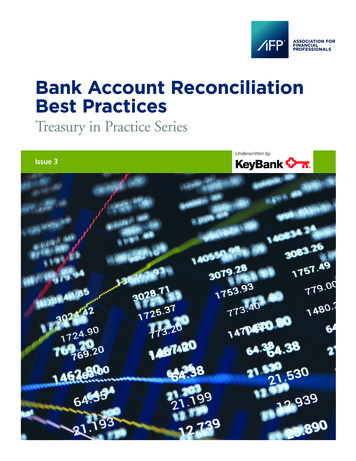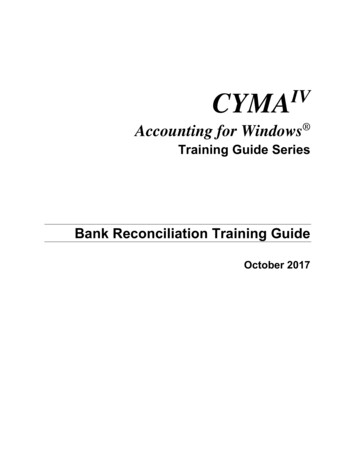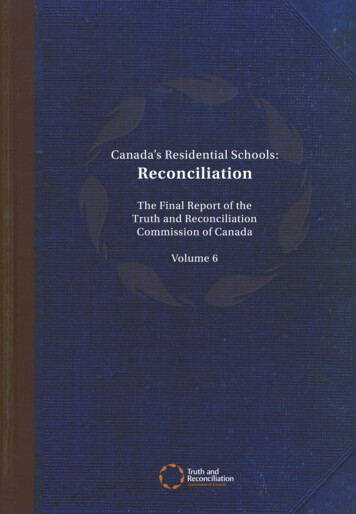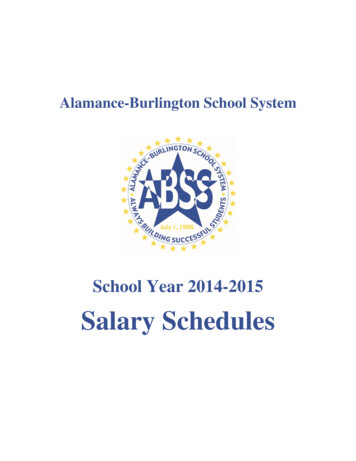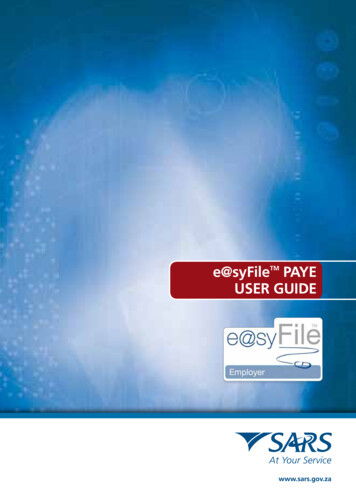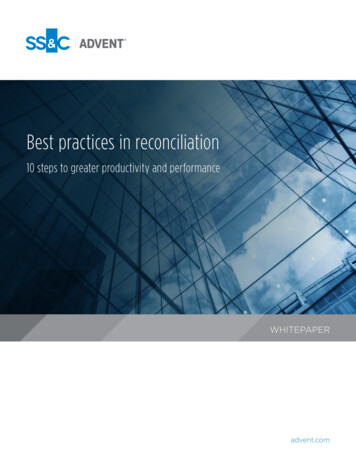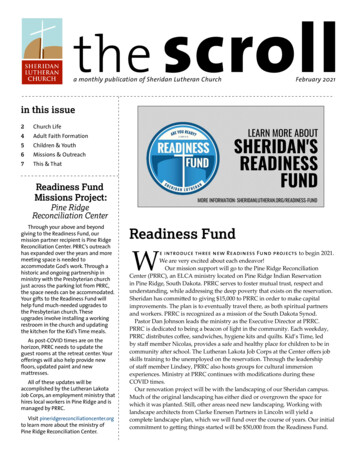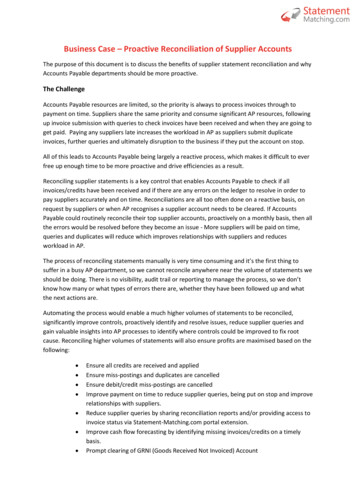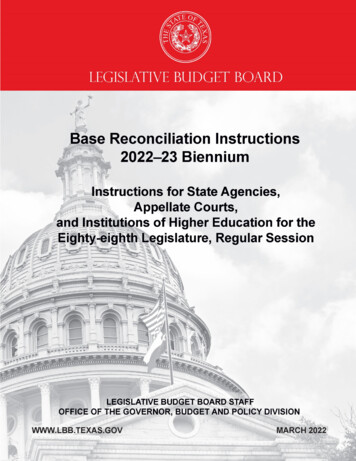
Transcription
INTRODUCTIONBASE RECONCILIATION INSTRUCTIONS
LEGISLATIVE BUDGET BOARDRobert E. Johnson Bldg.1501 N. Congress Ave. - 5th Floor Austin,TX 78701512/463-1200Fax: 512/475-2902http://www.lbb.texas.govM E M O R AN D UMTO:Agency Heads and Financial OfficersState Executive and Judicial Agencies, Departments, and CourtsFROM:Sarah Hicks, Director, Governor’s Office, Budget and Policy DivisionJerry McGinty, Director, Legislative Budget BoardDATE:March 16, 2022SUBJECT:2022–23 Base ReconciliationThe development of the estimated 2022–23 base spending level is the first step of the2024–25 Legislative Appropriations Request (LAR) process. Each state agency, appellatecourt, and institution of higher education is required to submit a 2022–23 basereconciliation for review and approval by its assigned analysts at the Legislative BudgetBoard (LBB) and Governor's Office, Budget and Policy Division (Governor’s Office).The base approved by the LBB and the Governor’s Office staff, with some possibleadjustments, will become the basis for developing the 2024–25 LegislativeAppropriations Request.The 2022–23 base reconciliation will be entered directly into the Automated Budget andEvaluation System of Texas (ABEST). Each agency should submit a base reconciliationby the date identified in the submission schedule.Step-by-step instructions, including a sample reconciliation, can be found on the LBBwebsite at https://www.lbb.texas.gov/Agencies Portal.aspx Instructions BaseReconciliation.If you have questions or need assistance, please contact the LBB or Governor’s Officeanalyst assigned to your agency. We look forward to working with you on this veryimportant stage of the appropriations process.Mailing Address: P.O. Box 12666 Austin, TX 78711-2666
CONTENTSINTRODUCTION . 1STATE BUDGET CYCLE . 1PROCESS . 2SUBMISSION DATES . 2STEP-BY-STEP GUIDELINES . 61. IDENTIFY REGULAR APPROPRIATIONS FOR EACH METHOD OF FINANCE BY CATEGORY OF FUND . 6CATEGORIES OF FUNDS . 72. IDENTIFY RIDER APPROPRIATIONS . 83. IDENTIFY SUPPLEMENTAL, SPECIAL, OR EMERGENCY APPROPRIATIONS. 94. IDENTIFY GOVERNOR’S DISASTER/DEFICIENCY/EMERGENCY GRANTS. 105. IDENTIFY TRANSFERS TO OR FROM THE AGENCY . 106. IDENTIFY UNEXPENDED BALANCES AUTHORITY . 117. IDENTIFY BASE ADJUSTMENTS . 128. IDENTIFY APPROPRIATION LAPSES . 129. IDENTIFY THE AUTHORIZED NUMBER OF FULL-TIME-EQUIVALENT POSITIONS. 1210. PROVIDE COMMENTS TO EXPLAIN ADJUSTMENTS TO THE REGULAR APPROPRIATIONS . 12MARCH 2022LEGISLATIVE BUDGET BOARD ID: 7416i
INTRODUCTIONThe Base Reconciliation process enables state agencies, appellate courts, and public institutions of higher education toreconcile their original appropriations by method of finance (MOF) and full-time-equivalent (FTE) positions to the finalfiscal year 2021 expended, the fiscal year 2022 estimated, and the fiscal year 2023 budgeted amounts.The 2022–23 Base Reconciliation approved by Legislative Budget Board (LBB) staff and the Office of the Governor(OOG), Budget and Policy Division, staff will become the basis for the General Revenue Funds and General Revenue–Dedicated Funds limits provided to state agencies for preparing their baseline requests for the 2024–25 biennium. The2022–23 biennial base is the total of the estimated expenditures for fiscal year 2022 plus the budgeted expenditures forfiscal year 2023 for the agency’s General Revenue Funds and General Revenue–Dedicated Funds amounts.STATE BUDGET CYCLEFigure 1 shows the two-year state budget cycle, which may be subject to change. The portion of the cycle that pertains tothe information in this document has a black border.FIGURE 1TEXAS STRATEGIC PLANNING AND PERFORMANCE BUDGETING SYSTEMMARCH 2022SOURCE: Legislative Budget Board.MARCH 2022LEGISLATIVE BUDGET BOARD ID: 74161
BASE RECONCILIATION INSTRUCTIONSINTRODUCTIONPROCESSAGENCY SUBMISSIONAll agencies, institutions of higher education, appellate courts, and judicial branch agencies enter all base reconciliationdata directly into the Automated Budget and Evaluation System of Texas (ABEST), located on the LBB’s website atabest1.lbb.state.tx.us . Agencies that do not have a user ID and password for ABEST must request access by submitting aLogon Request Form at loginreqagy.lbb.state.tx.us.REVIEWLBB and OOG staff review each submission and raise any questions or concerns regarding appropriations and adjustments.In some cases, revisions to the reconciliation may be necessary to comply with legislative appropriation authority providedin the General Appropriations Act and other legislation affecting appropriations. If requested, agencies may be required toreconcile other budget-related items (e.g., capital budgets or estimated revenue collections) in a format specified by theLBB and the OOG.APPROVALAfter the review process is complete, LBB and OOG staff approve the 2022–23 Base Reconciliation, which becomes thebasis for the General Revenue Funds and General Revenue–Dedicated Funds limit provided to agencies for preparingbaseline requests for the 2024–25 biennium.SUBMISSION DATESFigure 2 (pages 3 and 4) shows the submission due dates for the 2022–23 Base Reconciliation.2LEGISLATIVE BUDGET BOARD ID: 7416MARCH 2022
INTRODUCTIONBASE RECONCILIATION INSTRUCTIONSFIGURE 2BASE RECONCILIATION SUBMISSION SCHEDULE, 2022–23 BIENNIUMMAY 6, 2022Commission on the ArtsJudiciary Section, Comptroller’s DepartmentOffice of the Attorney GeneralCommission on Law EnforcementBehavioral Health Executive CouncilState Law LibraryBond Review BoardLibrary and Archives CommissionCancer Prevention and Research Institute of TexasDepartment of Licensing and RegulationOffice of Capital and Forensic WritsLow-level Radioactive Waste DisposalCompact CommissionBoard of Chiropractic ExaminersOffice of Court Administration, Texas Judicial CouncilTexas Board of NursingSupreme Court of TexasOptometry BoardCourt of Criminal AppealsPension Review BoardCourts of Appeals (14)Board of PharmacyTexas State Board of Dental ExaminersCommission on State Emergency CommunicationsTexas Emergency Services Retirement SystemTexas Ethics CommissionExecutive Council of Physical Therapyand Occupational Therapy ExaminersBoard of Plumbing ExaminersOffice of the State Prosecuting AttorneyCommission on Fire ProtectionRacing CommissionFuneral Service CommissionSecurities BoardBoard of Professional GeoscientistsSoil and Water Conservation BoardHealth Professions CouncilPublic Utility Commission of TexasHigher Education Coordinating BoardAgencies and Institutions of Higher EducationDepartment of Housing and Community AffairsCommission on Jail StandardsTexas Medical BoardOffice of Public Utility CounselVeterans CommissionBoard of Veterinary Medical ExaminersState Commission on Judicial ConductMAY 13, 2022State Office of Administrative HearingsSecretary of StateAlcoholic Beverage CommissionTeacher Retirement System of TexasAnimal Health CommissionDepartment of TransportationJuvenile Justice DepartmentReimbursements to the Unemployment CompensationBenefit AccountMilitary DepartmentDepartment of Motor VehiclesTexas Workforce CommissionState Preservation BoardMARCH 2022LEGISLATIVE BUDGET BOARD ID: 74163
BASE RECONCILIATION INSTRUCTIONSINTRODUCTIONFIGURE 2 (CONTINUED)BASE RECONCILIATION SUBMISSION SCHEDULE, 2022–23 BIENNIUMMAY 20, 2022Department of AgricultureTexas Lottery CommissionCommission on Environmental QualityParks and Wildlife DepartmentFacilities CommissionDepartment of Public SafetyDepartment of Family and Protective ServicesRailroad CommissionDepartment of State Health ServicesState Office of Risk ManagementHistorical CommissionWater Development BoardGeneral Land OfficeMAY 27, 2022School for the Blind and Visually ImpairedOffice of the GovernorComptroller of Public AccountsHealth and Human Services CommissionDepartment of Criminal JusticeDepartment of Information ResourcesSchool for the DeafOffice of Injured Employee CounselTexas Education AgencyDepartment of InsuranceEmployees Retirement System of TexasOffice of Public Insurance CounselPublic Finance AuthorityLegislative Agencies4LEGISLATIVE BUDGET BOARD ID: 7416MARCH 2022
INTRODUCTIONBASE RECONCILIATION INSTRUCTIONSHIGHLIGHTS AND WHAT’S NEWThese instructions are similar to those used for preparing the 2020–21 biennial Base Reconciliations. Please see the followingnotable highlights and differences: Relevant Legislation. Consistent with processes implemented during previous years, agencies should adjustappropriated amounts, as shown in the Conference Committee Reports on House Bill 1, Eighty-sixth Legislature, 2019,and Senate Bill 1, Eighty-seventh Legislature, Regular Session, 2021, as appropriate, for the following legislation:oSenate Bill 500, Eighty-sixth Legislature, 2019;oHouse Bill 3317, Eighty-sixth Legislature, 2019;oHouse Bill 2896, Eighty-seventh Legislature, Regular Session, 2021;oHouse Bill 9, Eighty-seventh Legislature, Second Called Session, 2021; andoooHouse Bill 2, Eighty-seventh Legislature, Regular Session, 2021;House Bill 5, Eighty-seventh Legislature, Second Called Session, 2021;Senate Bill 8, Eighty-seventh Legislature, Third Called Session, 2021. Grants from Trusteed Programs within the Office of the Governor. Use Method of Finance (MOF) Code 8000(Other Funds) to report grant funds received from the Trusteed Programs within the Office of the Governor. Thesefunds include any grant received pursuant to the Eighty-sixth and Eighty-seventh Legislatures, General AppropriationsAct (GAA), for either the 2020–21 or 2022–23 biennium, Article I, Trusteed Programs within the Office of the Governor,Rider 2, Disaster and Deficiency Grants. MOF Code 8000 also is required to report any funds received from TrusteedPrograms when the sources were the emergency appropriations made available by the 2020–21 or 2022–23 GAAs,Article I, Trusteed Programs, Rider 3, Governor’s Emergency Appropriations. Entries reported as a Governor’sDisaster/Deficiency/Emergency Grant (GV) will be treated similarly to Interagency Contracts for budget summarypurposes. Centralized Accounting and Payroll/Personnel System (CAPPS). Agencies utilizing or deploying onto the TexasComptroller of Public Accounts’ (CPA) statewide enterprise resource planning system, known as CAPPS, are requiredto identify CAPPS-related expenditures using Capital Expenditure Category Code 8000. Please note the followingrequirements:oall CAPPS costs, including ongoing maintenance, should be identified appropriately as capital expenseswithin Capital Expenditure Category Code 8000, including salaries and other staffing costs; andoagencies transitioning to or implementing CAPPS as a hub agency, such as the Department ofTransportation or the Health and Human Services Commission, also should identify related expenditures inaccordance with this schedule. Payroll Contribution for Group Health Insurance and Additional Payroll Contribution for RetirementContribution. The payroll contribution for Group Health Insurance, pursuant to the 2020–21 and 2022–23 GAAs,Article IX, §17.03, Payroll Contribution for Group Health Insurance, and the retirement contribution, pursuant to the2020–21 and 2022–23 GAAs, Article IX, §17.06, Additional Payroll Contribution for Retirement Contribution, should betreated as expenditures and not as transfers. Accordingly, they should not be shown as appropriations adjustments inthe Base Reconciliation. Instead, for contributions pursuant to these provisions, agencies should use Objects ofExpense Code 2009. Please contact your LBB or OOG analyst if you have additional questions. COVID-19 Appropriations. Use MOF code 0325 (not MOF Code 0555) for all federal awards and expenditures forfederal bills related to recovery from the COVID-19 pandemic, including the following: Coronavirus Preparedness andResponse Supplemental Appropriations Act (2020); Families First Coronavirus Response Act; Coronavirus Aid, Relief,and Economic Security Act; Paycheck Protection Program and Healthcare Enhancement Act; Coronavirus Responseand Relief Supplemental Appropriations Act; American Recovery Plan Act of 2021; and any other federal funding thatwas used for COVID-related expenditures, even if not from the previously mentioned bills. Supplemental Documents in ABEST. Article II agencies can now submit/upload supplemental documents they deemuseful, or as required by their assigned LBB budget analyst, to assist with the Base Reconciliation through theSupplementals menu in ABEST. The menu will not display for non-Article II agencies.MARCH 2022LEGISLATIVE BUDGET BOARD ID: 74165
STEP-BY-STEP GUIDELINESFollow each of the following steps to complete the 2022–23 Base Reconciliation. Please contact your LBB or OOG analystif you have any questions before making a submission.1.Identify regular appropriations for each method of finance (MOF) by category of fund.2.Identify rider appropriations.3.Identify supplemental, special, or emergency appropriations.4.Identify Governor’s Disaster/Deficiency/Emergency Grants.5.Identify transfers to or from the agency.6.Identify unexpended balances authority.7.Identify base adjustments.8.Identify appropriation lapses.9.Identify the authorized number of full-time-equivalent (FTE) positions.10. Provide comments to explain adjustments to the regular appropriations.1. IDENTIFY REGULAR APPROPRIATIONS FOR EACH METHOD OF FINANCE BY CATEGORY OF FUNDRegular Appropriations are the original amounts included in an agency’s MOF table in the General Appropriations Act(GAA). Regular Appropriations commonly are called above-the-line amounts, exclusive of rider appropriations and otherappropriations not included in bill pattern strategies.Enter the Regular Appropriation identified in the MOF section of the agency’s bill pattern from the relevant appropriationsbill for each fund or account within the appropriate fund category (General Revenue Funds, General Revenue–DedicatedFunds, Other Funds, and Federal Funds). Separately reconcile each fund or account within a fund category. Several fundsor accounts could be placed within each category (e.g., General Revenue Funds and General Revenue Funds Match forMedicaid).Subsequent entries, or adjustments, must include increases or decreases to the Regular Appropriation amounts. Select orenter the correct authority for each adjustment within the Summary Description field in ABEST.Determine Regular Appropriation amounts using the following sources: for fiscal year 2021, use amounts identified in the MOF table in the Conference Committee Report onHouse Bill 1, Eighty-sixth Legislature, 2019; and for fiscal years 2022 and 2023, use amounts identified in the MOF table from the Conference CommitteeReport on Senate Bill 1, Eighty-seventh Legislature, Regular Session, 2021.Information for properly identifying the Method of Finance and Revenue Object codes is available atwww.lbb.texas.gov/Agencies Portal.aspx Reference Documents ABEST Method of Finance Codes.IMPORTANTDo not enter the amounts shown in the MOF table from the final GAA, which is published after the regular legislative sessionand includes adjustments to appropriations to incorporate Article IX appropriations and other legislation and resolutions. Use onlythe Conference Committee Reports located on the LBB website (www.lbb.texas.gov Budget Budget Documents bySession).6LEGISLATIVE BUDGET BOARD ID: 7416MARCH 2022
GUIDELINESBASE RECONCILIATION INSTRUCTIONSAdditional considerations include the following guidelines: start with the exact Regular Appropriation amount listed in the Conference Committee Report for each MOFfor each fiscal year; do not net out any adjustments to amounts reported as Regular Appropriations; do not include amounts labeled Other Direct and Indirect Costs Appropriated Elsewhere in this Act; use current fund and account numbers and names. Some funds and accounts shown in the GAA might beoutdated. For example, some funds identified as General Revenue–Dedicated Accounts in the GAA may nothave been exempted from funds consolidation by other legislation. Refer to House Bill 3317, Eighty-sixthLegislature, 2019, and House Bill 2896, Eighty-seventh Legislature, Regular Session, 2021, for a completelisting of General Revenue–Dedicated Funds accounts for fiscal years 2021, 2022, and 2023; do not use fund names, account names, or account numbers that are not included in the ABEST classificationsystem for the budget cycle; do not use labels or codes from an internal accounting system, Comptroller of Public Accounts’ UniformStatewide Accounting System (USAS) classification, or a previous budget cycle; and do not use Undistributed MOF as a code. Fund and account classifications for the 2020–21 and 2022–23biennia are available at www.lbb.texas.gov/Agencies Portal.aspx Reference Documents ABEST Method of Finance Codes.CATEGORIES OF FUNDSABEST uses four categories of funds: (1) General Revenue Funds, (2) General Revenue–Dedicated Funds, (3) FederalFunds (MOF Code 0555 for regular Federal Funds and MOF Code 0325 for COVID-related federal funding), and (4)Other Funds. Method of Finance Codes assign each MOF to a particular category of fund. ABEST sums amounts in theBase Reconciliation by category of fund.GENERAL REVENUE FUNDSGeneral Revenue Funds include all nondedicated General Revenue Funds and accounts, including Earned Federal Funds. Earned Federal Funds include funds received as a reimbursement for previous expenditures. All Federal Fundsreceived in connection with a federally funded program are treated as General Revenue when the governingagreement does not require the funds to be spent on that program. Earned Federal Funds may include indirectcost receipts and interest earned on advances of Federal Funds; and Tobacco Settlement Receipts require the appropriate MOF codes for funds received as tobacco settlementreceipts that are not dedicated.GENERAL REVENUE–DEDICATED FUNDSGeneral Revenue–Dedicated Funds include all dedicated General Revenue Funds accounts. The MOF codes on the LBBwebsite incorporate changes made by House Bill 3317, Eighty-sixth Legislature, 2019, and House Bill 2896, Eightyseventh Legislature, Regular Session, 2021, and provide a complete listing of the General Revenue–Dedicated Fundsaccounts.The MOF codes are available at www.lbb.texas.gov/Agencies Portal.aspx Reference Documents ABEST Methodof Finance Codes.FEDERAL FUNDSFederal Funds include all revenue received from the federal government that is not classified as Earned Federal Funds. TheMOF code for most Federal Funds is 0555. Federal reimbursements related to natural disasters should be shown as FederalFunds.MARCH 2022LEGISLATIVE BUDGET BOARD ID: 74167
BASE RECONCILIATION INSTRUCTIONSGUIDELINESUse MOF Code 0325 for all federal awards from the six federal bills related to recovery from the COVID-19 pandemic,including: (1) Coronavirus Preparedness and Response Supplemental Appropriations Act (2020); (2) Families FirstCoronavirus Response Act; (3) Coronavirus Aid, Relief, and Economic Security Act; (4) Paycheck Protection Program andHealthcare Enhancement Act; (5) Coronavirus Response and Relief Supplemental Appropriations Act; and (6) AmericanRecovery Plan Act of 2021, and any other federal funding that was used for COVID-related expenditures, even if not fromthe six previously mentioned bills.OTHER FUNDSOther Funds include Appropriated Receipts, Interagency Contract revenue, bond proceeds, and certain constitutionallyor statutorily dedicated funds. These funds should be itemized using MOF codes from the list atwww.lbb.texas.gov/Agencies Portal.aspx Reference Documents ABEST Method of Finance Codes. Appropriated Receipts include all receipts—such as fees, reimbursements, and other revenue—received for anauthorized service and appropriated to the agency, usually to offset costs of providing the service. The MOFcode for Appropriated Receipts is 0666.Appropriated Receipts should be organized by specific appropriation authority, for example, Eighty-sixthLegislature, GAA, 2020–21 Biennium, Article IX, Section 8.02, Reimbursements and Payments; Section 8.03,Surplus Property; or Section 8.07, Appropriation of Collections for Seminars and Conferences. Interagency Contracts include funds received from another state agency in exchange for services, material, orequipment through a written agreement. Unless directed otherwise by the LBB or OOG, these funds do notinclude transfer of funds from another state agency pursuant to enactment of legislation that transfersprograms. The MOF code for Interagency Contracts typically is 0777.The MOF section in the Summary of Budget by Method of Finance should show the source of fundsapplicable to the fiscal year for which the amount was appropriated. An agency purchasing goods or servicesfrom another state entity uses the original MOF (General Revenue Funds, Federal Funds, etc.). The agencyacting as the vendor or provider of goods or services uses Interagency Contracts as the MOF.Agencies receiving criminal justice grants from the Trusteed Programs within the Office of the Governor,regardless of the original funding source, should identify those funds using MOF code 0444, Criminal JusticeGrants, which are considered a type of Interagency Contract. Agencies must explain in the comments sectionthe amount, purpose, and original funding source of each criminal justice grant. Bond proceeds include appropriated funds from authorized General Obligation or revenue bond issuances.Agencies appropriated bond proceeds for new construction, rehabilitation, and repair projects may be requiredto submit supplemental information regarding budgeted projects, including project categories and descriptions.Examples include water and wastewater improvements, deferred maintenance, locations, and timelines.2. IDENTIFY RIDER APPROPRIATIONSRider Appropriations (RI) include amounts that are not itemized specifically in the agency’s MOF table in the GAA, butwhich are appropriated to the agency by a general, special, or agency-specific provision of a GAA. General Provisions areprovided in the GAA, Article IX; Special Provisions are included at the end of some articles; and agency-specific provisions,or riders, are included at the end of the agency’s bill pattern.For each fund or account, enter each Rider Appropriation made by the GAA for the agency. Each entry should show theamount stated in the rider as the sum-certain or estimated amount. Subsequent entries, or adjustments, must show increasesor decreases to the original rider amount. Enter the correct legal citation for each rider amount and adjustment. Note thatthe reference number for a rider in the GAA for one biennium may be different from the corresponding rider in the GAAfor the next biennium.Additional considerations include the following:8LEGISLATIVE BUDGET BOARD ID: 7416MARCH 2022
GUIDELINESBASE RECONCILIATION INSTRUCTIONS some riders provide estimated appropriation authority for revenue collections or unexpended balances, with theestimated amounts identified in the riders and included in the agency’s regular appropriations in the MOFtable. If the actual amounts are greater than or less than the amount stated in the rider, show the incrementaldifference as a separate entry. If multiple revisions to an estimate result from different events, list each revisionseparately and show the same rider authorization for each. Appropriation reductions due to uncollectedrevenue may be shown either as a revised receipt Rider Appropriation adjustment or as a Lapsed Appropriationadjustment; provisions in the GAA, Article IX, authorize agencies to increase or decrease appropriations; for example,Article IX, Part 13, Federal Funds, and Article IX, Section 8.02, Reimbursements and Payments, in the 2020–21 and the 2022–23 GAAs; use caution when identifying appropriation adjustments related to a Capital Budget rider. Amounts shown inCapital Budgets are included in the agency’s MOF table. However, agencies may be authorized to carryforward unspent appropriations for a Capital Budget item. For example, Article IX, Section 14.03, Transfers –Capital Budget, enables agencies to carry forward unspent Capital Budget amounts from the first year to thesecond year of the biennium. Capital Budget riders in agency bill patterns may provide other authority forCapital Budget adjustments or may contain restrictions; and when an appropriation is contingent upon certification by the Texas Comptroller of Public Accounts (CPA),include only the certified amount. If the entire appropriation is not certified, include the appropriation statedin the rider, then show a negative entry for the amount that is not certified. Note that the appropriation relatedto the certification might be included in the Regular Appropriation in the MOF table. In these instances, donot enter the amount as a Rider Appropriation because the result will double-count the appropriation.REMINDER: EARNED FEDERAL FUNDSPursuant to Article IX, §13.10, of the 2022–23 GAA and Article IX, §13.11 of the 2020–21 GAA, Earned Federal Funds (EFF) areclassified as collected revenue to the General Revenue Fund and included as part of the MOF Code 001. See the 2022–23 GAA,Article IX, §13.10(b), for the amount of General Revenue Funds appropriations contingent on the collection of EFF by agency.The estimated appropriation authority and authority to carry forward unexpended and unobligated balances within a biennium forexpenditure of EFF is provided by the 2022–23 GAA, Article IX, §13.10(f).Affected agencies should identify the incremental amount of EFF greater than the amounts estimated for fiscal years 2021, 2022,and 2023 in the 2022–23 GAA, Article IX, §13.10(b), as Rider Appropriations within the General Revenue Funds MOF. Affectedagencies receiving additional appropriation authority via this provision should review and comply with the notification andreporting requirements included in Article IX, §13.10(c) and (d). Any reduction due to uncollected revenue should be shown as aLapsed Appropriation. Show any unspent, unobligated funds in fiscal year 2022 carried forward into fiscal year 2023 as a RiderAppropriation.Pursuant to the 2022–23 GAA Article IX, §13.10(h), EFF collected for post-retirement health insurance should not be included inagency appropriations. Agencies currently including collections for post-retirement health insurance in General Revenue Fundsappropriations must reduce the appropriation by this amount. Agencies should contact the Employees Retirement System ofTexas to determine amounts for retiree insurance.3. IDENTIFY SUPPLEMENTAL, SPECIAL, OR EMERGENCY APPROPRIATIONSSupplemental, Special, or Emergency Appropriations (SU) may apply to any fund or account. For each fund or account,enter appropriation amounts made specifically by legislation other than the GAA. Subsequent entries, or adjustments,must show increases or decreases to the original supplemental or special appropriations amount. However, any lapses ofsupplemental or special appropriations should be entered as a Lapsed Appropriation adjustment type. Select or enter thecorrect authority for each adjustment within the Summary Description field in ABEST.Supplemental or special appropriations include but are not limited to the following sources:MARCH 2022LEGISLATIVE BUDGET BOARD ID: 74169
BASE RECONCILIATION INSTRUCTIONSGUIDELINES Senate Bill 500, Eighty-sixth Legislature, 2019; House Bill 3317, Eighty-sixth Legislature, 2019; House Bill 2, Eighty-seventh Legislature, Regular Session, 2021; House Bill 2896, Eighty-seventh Legislature, Regular Session, 2021; House Bill 5, Eighty-seventh Legislature, Second Called Session, 2021; House Bill 9, Eighty-seventh Legislature, Second Called Session, 2021; Senate Bill 8, Eighty-seventh Legislature, Third Called Session, 2021; and Governor’s Veto Proclamation reductions.Appropriations referenced in the Governor’s Veto Proclamation should represent their current status in CPA’s USAS andshould be shown as SU reductions as appropriate. Therefore, amounts related to the Governor’s vetoes must be negativeentries in this category.4. IDENTIFY GOVERNOR’S DISASTER/DEFICIENCY/EMERGENCY GRANTSGoverno
o agencies transitioning to or implementing CAPPS as a hub agency, such as the Department of Transportation or the Health and Human Services Commission, also should identify related expenditures in accordance with this schedule. Payroll Contribution for Group Health Insurance and Additional Payroll Contribution for Retirement Contribution.

